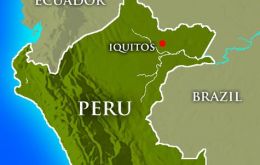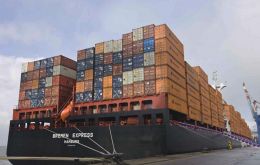MercoPress. South Atlantic News Agency
Tag: economy
-
Tuesday, May 25th 2010 - 00:57 UTC
IMF bluntly tells Spain austerity and reform measures are not enough

The International Monetary Fund has raised fresh concerns about Spain's economy, saying “far-reaching” reforms are needed to ensure its recovery. It said the country faced “severe” challenges, including the need to urgently reform a “dysfunctional” labour market, and its banking sector.
-
Tuesday, May 18th 2010 - 21:51 UTC
Peruvian economy rebounds and expands 8.76% in first quarter

The Peruvian economy expanded 8.76% in the first quarter of 2010 compared to the same period a year ago, the highest rate in the last 17 months, according to the head of the country’s Statistics Office, Renán Quispe.
-
Saturday, May 15th 2010 - 04:39 UTC
Volcker Fears Potential Disintegration of the Euro, Without Common Fiscal Policy

Former Federal Reserve chairman and advisor of the Obama administration is concerned that the Euro area may break up after the Greek fiscal crisis that sparked an unprecedented bailout by the region’s members.
-
Saturday, May 15th 2010 - 04:37 UTC
IMF Warns Developed Countries on “Urgent” Need to Cut Budget Deficits

The International Monetary Fund has warned developed nations they face an “urgent” need to cut their budget deficits. Its warning comes as a slew of European countries face public unrest over their attempts to do just that.
-
Saturday, May 15th 2010 - 04:20 UTC
German Economy Rebounds in the First Quarter of 2010 with 0.2% Expansion

The German economy—Europe's largest—expanded 0.2% in the first quarter of 2010, beating forecasts of zero growth. Many analysts predicted German GDP would stagnate in the quarter.
-
Friday, May 14th 2010 - 04:40 UTC
Portugal Joins Euro Belt-Tightening Bandwagon but with Strong Political Support

Portugal has become the latest country to introduce austerity measures, after both Greece and Spain took similar steps to stabilize public finances in the face of massive debt.
-
Friday, May 14th 2010 - 04:34 UTC
Mrs. Kirchner Promises to Refinance Provincial Government Debts

The Argentine government said it will refinance 89% of the debt that most of the country’s provinces hold with the federal government, announced President Cristina Fernandez de Kirchner and Economy Minister Amado Boudou.
-
Friday, May 14th 2010 - 04:20 UTC
Italian Defaulted Bond Holders Seem Prepared to Accept Argentine Debt-Swap Plan

In an extensive report, the Task Force Argentina (TFA)—which represents Italians holding some 4.5 billion US dollars in defaulted Argentine sovereign bonds—gave an ambiguous declaration over Argentina's debt-swap plan.
-
Friday, May 14th 2010 - 04:15 UTC
Unemployment Benefits Filing Dips but Labour Market Remains Weak

The number of US workers filing for unemployment benefits dipped again last week but by a tiny margin that experts say does not signal a strengthening of the US labor market.
-
Friday, May 14th 2010 - 04:10 UTC
Home Repossessions in the US Hit Record High; Candle at the End of the Tunnel

The number of US homes being repossessed hit an all-time high last month, but is set to start falling, says the body that tracks the figures. Banks took control of 92,432 properties in April, up 1% from March, and a 45% rise from a year earlier, said RealtyTrac.
